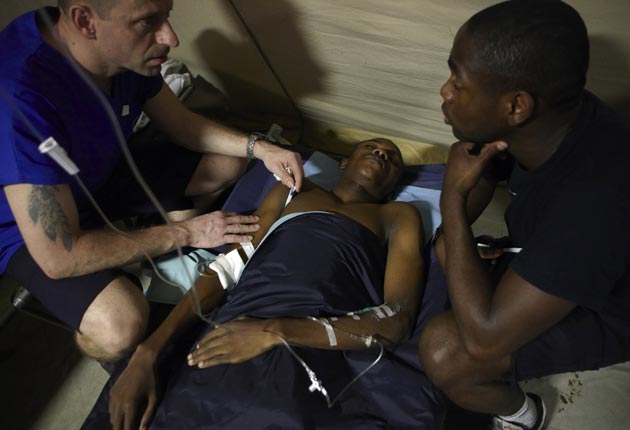Beer and biscuits saved man trapped in rubble for 11 days
Haiti survivor tells his story as death toll continues to climb

The time for miracles seemed to have passed but, 11 days after the earthquake that flattened large parts of Port-au-Prince, Wismond Exantus was pulled from under the rubble without a single broken bone, without even a fracture.
And he emerged smiling and in apparently good physical condition from the wreckage of the Napoli Inn Hotel. "I was hungry," the 24-year-old told reporters from his hospital bed. "But every night I thought about the revelation that I would survive. It was God who was tucking me away in his arms. It gave me strength."
His brothers had pleaded with rescuers to keep searching for him, even after the Haitian government declared that the search for survivors was ending and relief efforts would be diverted to aid the much-needed distribution of food and water to survivors, including at least 250,000 homeless in the capital.
Exantus, who had been working as a cashier at a grocery store on the ground floor of the hotel, survived by eating whatever produce from its shelves he could find within reach. He had dived under a desk when the earthquake struck. Trapped in a dark, tiny space, he lay on his back for the whole of the 11 days, rationing out the cola, beer and cookies that he could find within reach. "I would eat anything I found," he told The Associated Press. "After the quake, I didn't know when it was day and when it was night."
The rescue effort started when one of his brothers helped get a Greek search team to the site after hearing Exantus' voice, said Apostolos Dedas, a mission leader for the Greek team. "It is very emotional," Dedas said. "It is the best thing that can happen to you when you are a rescuer."
As members of the Exantus family and onlookers gathered round the scene of the rescue, the 24-year-old was able to respond to rescuers' calls and questions by knocking. The Greek team made a narrow tunnel to the pocket where Exantus had lain. A huge cheer went up as the survivor was pulled from the rubble, his black t-shirt and jeans covered in dust, hooked to a drip and taken away in an ambulance. In his hospital bed later he told his family: "When you are in a hole I will try to reach out to you, too."
As one family celebrated one story of survival against impossible odds, hundreds of thousands of other families continue to grieve. It is impossible to say how many are dead. A government tally says more than 150,000 bodies have been buried in mass graves since the quake of 12 January, but it seems unlikely that anyone has been able to keep count.
The total does not include other affected cities such as Jacmel, where thousands are believed dead, nor does it account for bodies buried or burned by relatives. "Nobody knows how many bodies are buried in the rubble, 200,000, 300,000?" the government communications minister Marie-Laurence Jocelyn Lassegue said yesterday. "Who knows the overall death toll?"
The United Nations said on Saturday that the government was declaring the search and rescue efforts at an end, so that priorities could switch to aiding the living. A government spokesman said 200,000 residents of Port-au-Prince have left for the countryside. Thousands of people are living in makeshift camps around the city, where conditions are verging on squalid.
After the chaos and complications of the early days of the relief effort, supplies of medicines, food and water and now getting through in greater quantities. American and Brazilian troops spent yesterday handing out food and water to thousands of people at a health centre in the Cite Soleil slum. They distributed 75,000 high-energy biscuits and thousands of litres of water, as well as other supplies.
"Every day is a better day than yesterday," said Lieutenant-General Ken Keen, commander of the US military operation in Haiti. "Tomorrow will be a better day than the day before." But despite that progress, aid agencies say they are fearful of diseases in the camps, and are also starting to see infections and complications arising from the amateur surgeries on the wounded in the first days after the quake.
As well as medicine and food, money was also starting to get through to survivors. Many of Haiti's banks were able to reopen for the first time over the weekend, days after the central bank restarted operations. Many Haitians who had been sent funds from family members abroad had been unable to get the cash.
Outside the country, Fidel Castro, the former Cuba president, joined the chorus of leftist Latin American leaders in expressing concern about the US efforts in Haiti, which have involved American soldiers assisting with the logistical task of dispensing aid and maintaining order. Castro wrote that "Without anyone knowing how or why," Washington dispatched troops "to occupy Haitian territory". The Bolivian President, Evo Morales, an ally, is seeking a UN condemnation of what he called the US occupation of Haiti.
Subscribe to Independent Premium to bookmark this article
Want to bookmark your favourite articles and stories to read or reference later? Start your Independent Premium subscription today.

Join our commenting forum
Join thought-provoking conversations, follow other Independent readers and see their replies